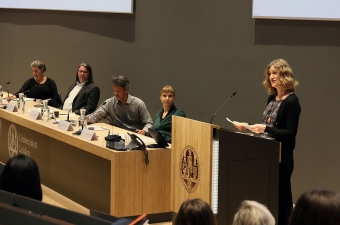The Grotius Centre for International Legal Studies yesterday hosted the first of the ICTY Legacy Lecture Series at Leiden University’s Hague campus. The lecture, entitled “The Story of the ICTY Registry: Running a Court – from prison to pro se”, was the first in a series of four, which will each tell the story of a different organ of the Tribunal and the Defence, as part of the ICTY Legacy Dialogues. The event was an opportunity to hear a “behind the scenes” perspective from ICTY Registry staff members and to learn about their individual experiences throughout their tenures.
Following an introduction to the ICTY Legacy Lecture Series by Professor Carsten Stahn, on behalf of the Grotius Centre for International Legal Studies, ICTY Deputy Registrar Kate Mackintosh provided opening remarks and acted as the moderator for the event. Ms Mackintosh reflected on the establishment and the uniquely diverse nature of the Registry: “The ICTY Registry was the very first of its kind. There was no blue-print for such an organ from the Nuremberg and Tokyo tribunals. The Registry had to develop services to support an international organisation, services required to support a court - the role of a registry in a national jurisdiction - as well as a range of unique functions specific to the operations of an international criminal court. The Tribunal's location outside the territory where the crimes took place necessitated services such as the transport of witnesses, outreach and translation. Further, since the court is not embedded in a state system, the Registry had to provide functions such as detention, witness protection and a legal aid scheme.”
The panel was composed of Chief Administrative Officer David Falces, Chief of Interpretation and Translation Services (CLSS) Maja Ružić, Commanding Officer of the United Nations Detention Unit (UNDU) Fraser Gilmour, and former pro se Liaison Officer in the Court Support Services Section, Ljiljana Hellman. While describing the collaboration between offices throughout the Tribunal, Mr Falces stated: “Effective administrative support is key to success, and in the unique environment of international criminal justice, our best results have been achieved when the substantive offices and the administration have worked together in active partnership in meeting the many challenges we have faced.”
Reflecting on the role of the CLSS, Ms Ružić stressed the powerful role of language and CLSS’ significant responsibility to produce accurate interpretations, despite often emotional and painful witness testimony. Speaking of the UNDU, Mr Gilmour discussed the development of an approach to detainees participating in hunger strikes based on international standards, and the collaboration this required between UNDU management, medical staff, and legal staff in the Registry. Ms Hellman closed the panel by sharing her experiences of working as a pro se Liaison Officer, explaining the fine line to be trod between providing adequate support to self-represented accused and maintaining the necessary neutrality of the Registry.
The ICTY Legacy Lecture Series continues on 19 October 2017 with “The Story of the Defence practising before the ICTY: Experiences From the Frontlines Defending Justice”, which will feature speakers and panellists from the Association of Defence Counsel practising before the International Courts and Tribunals (ADC-ICT).


